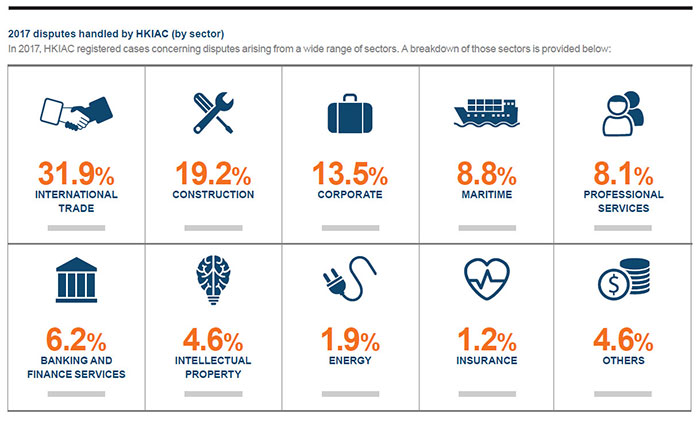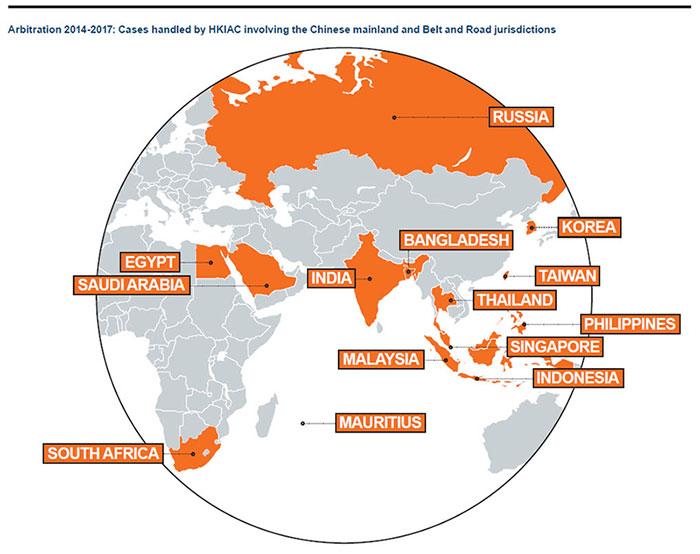Disputes handled by the Hong Kong International Arbitration Centre have reached record levels with one in four cases involving issues between the Chinese mainland and Belt and Road jurisdictions.
Last year, the Hong Kong International Arbitration Centre (HKIAC) responded to 532 new cases involving disputing parties. The outcomes of 297 cases were decided by its independent and internationally-recognised panel of expert arbitrators. Many of these commercial disagreements involved a complex chain of investments worth billions of US dollars.
As the Belt and Road Initiative gains momentum, HKIAC’s overall case load has increased 20% year-on-year. Since 2013, when the Initiative was announced, there has been 362 arbitration cases where at least one of the parties was from a Belt and Road jurisdiction, according to statistics compiled by HKIAC.
Disputes occur across all sectors. In 2017, HKIAC figures indicate the majority of arbitration cases involved international trade (31.9%), followed by corporate, banking and financial services (19.7%) and construction (19.2%) – a close third place. Maritime disputes accounted for 8.8% of the case load, closely followed by professional services (8.1%).
In 2014, only 11% of the disputes involved parties from the Chinese mainland and from a Belt and Road jurisdiction. By 2017 this had risen to 25%, reflecting the growing trust Chinese state-owned enterprises (SOEs) and private businesses place in Hong Kong as a centre for mediation.

“Chinese (mainland) companies feel they have an affinity with Hong Kong, and foreign investors know there are no surprises,” said HKIAC’s Secretary-General Sarah Grimmer. “Predictability is important. Parties know Hong Kong is regulated, has a rule of law and that the centre is independent and neutral.”

Why choose Hong Kong?
There are a number of reasons for using Hong Kong as a jurisdiction for arbitration. A key one, Grimmer says, is the city’s robust confidentiality provisions that attract corporates looking to avoid messy publicity about internal grievances. In addition, where there is a need to move swiftly in order to prevent the loss of assets, or destruction of potential evidence, Hong Kong courts issue urgent relief notices in a timely manner.
As one of the 159 signatories to the New York Convention, decisions handed down by HKIAC are enforceable across many jurisdictions. In comparison to arbitration’s far-reaching enforceability, court rulings in one jurisdiction may not be enforceable in another. Language barriers and different legal systems add further complexity to international parties seeking restitution via traditional court systems or arbitration in other jurisdictions.
“For example, you might have won your award but depending what you have put in your arbitration clause, your award might not be enforced. That goes into the heart of dispute resolution because that’s the only reason you go into arbitration. If you can’t get [your money], you’ve wasted your time,” says Grimmer.
According to Grimmer, around 15% of the parties named in an arbitration hearing simply do not turn up or turn up for a limited period of time, but the tribunal can still make a ruling and the corporate bringing the case to the tribunal can still win, despite the absence of the other party.

Vincent Connor, Partner and Head of Pinsent Masons’ Hong Kong office, also advises against taking complex commercial issues relating to Belt and Road infrastructure projects to court. He suggests these are better handled through arbitration, which draws on the expertise within arbitration panels to ensure a brisk, focused, professional approach that quickly identifies issues and provides resolution. He believes Hong Kong’s professional services have a big role to play in helping corporates in the stages before arbitration, in supporting the parties involved, narrowing the gap between them and helping them resolve issues together through mediation. Knowing the strengths and weaknesses in a case is key to dispute resolution.
Connor concludes: “Having access to absolutely cutting-edge engineering advice, top-of-the-class construction law advice, and people who can show you how to prove your claim or show you what you think is a huge loss is unprovable, can get a party into a framework where it really understands how strong or how weak its position is.”

China and beyond
Hong Kong’s growing appeal is also directly linked to increasing awareness among investors that their contracts need to include an enforceable arbitration clause that clearly states the location where parties will seek arbitration. This is especially important for international transactions since the HKIAC’s dispute resolution has the advantage of neutrality, flexibility, enforceability and language.
“Hong Kong’s traditional status as the connecting jurisdiction between Chinese and non-Chinese parties is more and more relevant as Chinese mainland parties enter contracts with foreign parties,” says Grimmer.
The outflow of Chinese mainland investment to Asian jurisdictions for Belt and Road projects, combined with growing foreign investment into these projects, create increasing complexity in business arrangements, especially when it comes to large construction and infrastructure projects.
With many parties involved in the supply chain, arbitration allows parties to determine the applicable law, language, and whether disputes under more than one contract with different parties can be run together before the same tribunal hearing, thereby saving time and costs, and lowers the risk of differing outcomes from different tribunals.
Reducing risk from the start
In the euphoria of having just won an agreement for a large-scale Belt and Road project, Grimmer would like those drawing up contracts to think ahead and decide at the onset of a planned project where arbitration and dispute resolution will be sought in case something goes wrong. In order to encourage more businesses to consider arbitration, HKIAC posts simple yet effective clauses free of charge on its website.
Among those seeking recourse with Hong Kong’s arbitrators include corporates from the Chinese mainland, Bangladesh, Egypt, India, Indonesia, Malaysia, Mauritius, Russia, Singapore, Korea, Thailand, Philippines, South Africa and Saudi Arabia.
Spreading the message
Another reason why demand for HKIAC arbitration is also increasing is due to its targeted promotional work in the region. Last year, Grimmer’s team began a three-year outreach project directed at emerging markets that are the recipients of Chinese outbound investment. This Hong Kong initiative seeks to encourage these jurisdictions to use HKIAC arbitration clauses to reduce risks associated with entering into large-scale projects and their associated foreign direct investment (FDI) risks. To date, ASEAN countries including Vietnam, Cambodia, Indonesia, Thailand and Myanmar are participating in this programme.


